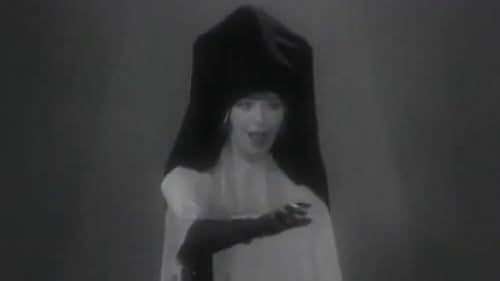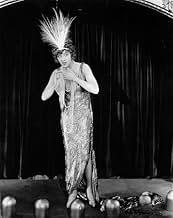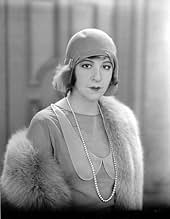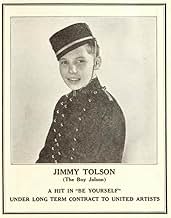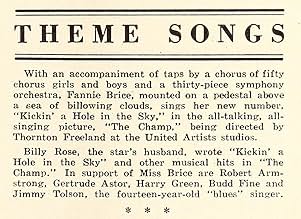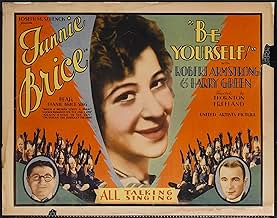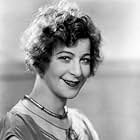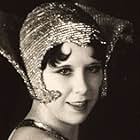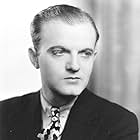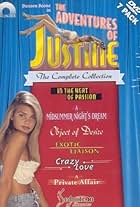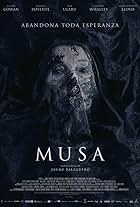Ethnic comedy of a nightclub entertainer trying to train a boxer.Ethnic comedy of a nightclub entertainer trying to train a boxer.Ethnic comedy of a nightclub entertainer trying to train a boxer.
Fanny Brice
- Fannie Field
- (as Fannie Brice)
Marjorie Kane
- Lola
- (as Marjorie 'Babe' Kane)
One-Eye Connelly
- Bit Role
- (uncredited)
Chuck Hamilton
- Club Patron
- (uncredited)
Anderson Lawler
- Patron in Night Club
- (uncredited)
Jimmy Tolson
- Blues Singer
- (uncredited)
- Director
- Writers
- All cast & crew
- Production, box office & more at IMDbPro
Storyline
Did you know
- TriviaThis film is one of over 200 titles in the list of independent feature films made available for television presentation by Advance Television Pictures announced in Motion Picture Herald 4 April 1942. At this time, television broadcasting was in its infancy, almost totally curtailed by the advent of World War II, and would not continue to develop until 1945-1946. Because of poor documentation (feature films were often not identified by title in conventional sources) no record has yet been found of its initial television broadcast.
- Quotes
Harry Field: A verbal agreement...
Fannie Field: ...is not worth the paper it's written on.
- ConnectionsFeatured in Broadway: The American Musical (2004)
- SoundtracksWhen a Man Loves a Woman
(1930) (uncredited)
Music by Ralph Rainger
Lyrics by Billy Rose
Sung twice by Fanny Brice, first time with
chorus including Patsy 'Babe' Kane, Gertrude Astor
Featured review
Fanny batters the big screen
Fanny Brice is one of those old-time performers who remains well-known only indirectly, through an impersonator: nowadays, most people who think they're familiar with Fanny Brice's style as a performer are actually recalling Barbra Streisand in 'Funny Girl' and 'Funny Lady'. (A similar problem exists with George M. Cohan, whom most people know only through James Cagney.) Personally, I've never understood the appeal of Fanny Brice, and I suspect that most of the people who claim to be Brice fans are really thinking of Streisand's two movies, which do NOT depict Brice's life or her personality with any accuracy. If you want to see a movie which tells the true story of Fanny Brice's life, watch Alice Faye in 'Rose of Washington Square' ... a movie which is so accurate in its depiction of Brice's romance with Nick Arnstein, the characters' names had to be changed to prevent Brice from suing.
Fanny Brice made very few films; late in her career, she starred in a popular radio sitcom as Baby Snooks, a bratty little girl. When performing this role, Brice would actually dress up in costume as a small girl, thus creating the misperception (which I still encounter) that radio actors often dressed up as the characters they played, for the benefit of the studio audiences. Brice was the only radio actor who did this. (Although a few other radio actors occasionally wore costumes for publicity photos.)
'Be Yourself!' is a poor film, although the underrated director Thornton Freeland does his job well with weak material. Part of the problem is that this movie is almost but not quite a musical: Fanny sings a couple of numbers, but they're spaced very thinly through the movie, so the transitions are jarring. And the movie isn't really a comedy either; Fanny makes a few wisecracks, but this film is basically a character study (of the male lead, not Fanny Brice's role). Although Brice gets top billing, the plot of the movie is really about the washed-up boxer played by Robert Armstrong. The make-up man has equipped Armstrong with a severely flattened nose, which looks quite realistic and is appropriate for his character ... but it also looks very distressing. Every time Fanny Brice looked at Armstrong, I expected her to sing "Second-Hand Nose".
This movie suffers from the presence of Harry Green, an actor who portrayed Jewish stereotypes in much the same way that Stepin Fetchit played Negro stereotypes. Harry Green's "Yiddisher" schtick grew so annoying that he eventually became unemployable in Hollywood, and he landed up in England ... giving exaggerated portrayals of pushy American Jews for British audiences who had no frame of reference for these characterisations.
Some parts of 'Be Yourself!' are so weird, I can't even guess if they're intentionally strange or merely inept. When Robert Armstrong's Irish-American boxer first becomes attracted to Fanny Brice's character (named Fanny Field, but clearly meant to be Jewish), he moves in with her. A few minutes later, Fanny Brice is screeching her way through a ditty: "My baby wants bacon, so that's what I'm makin', and I'm cookin' breakfast for the one I love." Nobody connected with this movie, including Brice herself, seems to find any irony whatever in the idea of a Jewish woman cooking bacon (which she just happens to have handy). I can't even tell if the irony is intentional: maybe the lyricist just needed a rhyme for "makin'".
At one point in this movie, Armstrong calls Fanny Brice 'a funny girl', which in post-Streisand hindsight looks like a deeply significant line, but wasn't meant to be.
I'll rate "Be Yourself!" precisely one point out of 10. Fanny Brice really didn't have the right sort of talent for movies.
Fanny Brice made very few films; late in her career, she starred in a popular radio sitcom as Baby Snooks, a bratty little girl. When performing this role, Brice would actually dress up in costume as a small girl, thus creating the misperception (which I still encounter) that radio actors often dressed up as the characters they played, for the benefit of the studio audiences. Brice was the only radio actor who did this. (Although a few other radio actors occasionally wore costumes for publicity photos.)
'Be Yourself!' is a poor film, although the underrated director Thornton Freeland does his job well with weak material. Part of the problem is that this movie is almost but not quite a musical: Fanny sings a couple of numbers, but they're spaced very thinly through the movie, so the transitions are jarring. And the movie isn't really a comedy either; Fanny makes a few wisecracks, but this film is basically a character study (of the male lead, not Fanny Brice's role). Although Brice gets top billing, the plot of the movie is really about the washed-up boxer played by Robert Armstrong. The make-up man has equipped Armstrong with a severely flattened nose, which looks quite realistic and is appropriate for his character ... but it also looks very distressing. Every time Fanny Brice looked at Armstrong, I expected her to sing "Second-Hand Nose".
This movie suffers from the presence of Harry Green, an actor who portrayed Jewish stereotypes in much the same way that Stepin Fetchit played Negro stereotypes. Harry Green's "Yiddisher" schtick grew so annoying that he eventually became unemployable in Hollywood, and he landed up in England ... giving exaggerated portrayals of pushy American Jews for British audiences who had no frame of reference for these characterisations.
Some parts of 'Be Yourself!' are so weird, I can't even guess if they're intentionally strange or merely inept. When Robert Armstrong's Irish-American boxer first becomes attracted to Fanny Brice's character (named Fanny Field, but clearly meant to be Jewish), he moves in with her. A few minutes later, Fanny Brice is screeching her way through a ditty: "My baby wants bacon, so that's what I'm makin', and I'm cookin' breakfast for the one I love." Nobody connected with this movie, including Brice herself, seems to find any irony whatever in the idea of a Jewish woman cooking bacon (which she just happens to have handy). I can't even tell if the irony is intentional: maybe the lyricist just needed a rhyme for "makin'".
At one point in this movie, Armstrong calls Fanny Brice 'a funny girl', which in post-Streisand hindsight looks like a deeply significant line, but wasn't meant to be.
I'll rate "Be Yourself!" precisely one point out of 10. Fanny Brice really didn't have the right sort of talent for movies.
- F Gwynplaine MacIntyre
- Feb 18, 2003
- Permalink
Details
- Release date
- Country of origin
- Language
- Also known as
- El punto flaco
- Production company
- See more company credits at IMDbPro
- Runtime1 hour 5 minutes
- Color
- Aspect ratio
- 1.20 : 1
Contribute to this page
Suggest an edit or add missing content


